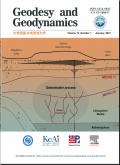The GNSS PWV retrieval using non-observation meteorological parameters based on ERA5 and its relation with precipitation
IF 3.3
4区 地球科学
Q2 GEOCHEMISTRY & GEOPHYSICS
引用次数: 0
Abstract
The pressure and temperature significantly influence precipitable water vapor (PWV) retrieval. Global Navigation Satellite System (GNSS) PWV retrieval is limited because the GNSS stations lack meteorological sensors. First, this article evaluated the accuracy of pressure and temperature in 68 radiosonde stations in China based on ERA5 Reanalysis data from 2015 to 2019 and compared them with GPT3 model. Then, the accuracy of pressure and temperature calculated by ERA5 were estimated in 5 representative IGS stations in China. And the PWV calculated by these meteorological parameters from ERA5 (ERA5-PWV) were analyzed. Finally, the relation between ERA5-PWV and precipitation was deeply explored using wavelet coherence analysis in IGS stations. These results indicate that the accuracy of pressure and temperature of ERA5 is better than the GPT3 model. In radiosonde stations, the mean BIAS and MAE of pressure and temperature in ERA5 are −0.41/1.15 hpa and −0.97/2.12 K. And the mean RMSEs are 1.35 hpa and 2.87 K, which improve 74.77% and 40.58% compared with GPT3 model. The errors of pressure and temperature of ERA5 are smaller than the GPT3 model in bjfs, hksl and wuh2, and the accuracy of ERA5-PWV is improved by 18.77% compared with the GPT3 model. In addition, there is a significant positive correlation between ERA5-PWV and precipitation. And precipitation is always associated with the sharp rise of ERA5-PWV, which provides important references for rainfall prediction.基于ERA5非观测气象参数的GNSS PWV检索及其与降水的关系
压力和温度对可降水量(PWV)的反演有显著影响。全球导航卫星系统(GNSS)的PWV检索由于缺乏气象传感器而受到限制。首先,基于2015 - 2019年ERA5 Reanalysis数据,对中国68个探空站的压力和温度精度进行了评估,并与GPT3模型进行了比较。然后,利用ERA5对中国5个代表性IGS站点的压力和温度进行精度估算。并对ERA5气象参数计算的PWV (ERA5-PWV)进行了分析。最后,利用小波相干分析深入探讨了ERA5-PWV与降水的关系。这些结果表明,ERA5模型的压力和温度精度优于GPT3模型。在探空台站,ERA5气压和温度的平均BIAS和MAE分别为- 0.41/1.15 hpa和- 0.97/2.12 K。均方根误差分别为1.35 hpa和2.87 K,分别比GPT3模型提高了74.77%和40.58%。在bjfs、hksl和wuh2中,ERA5的压力和温度误差小于GPT3模型,ERA5- pwv的精度比GPT3模型提高了18.77%。此外,ERA5-PWV与降水呈显著正相关。降水与ERA5-PWV的急剧上升密切相关,为降水预报提供了重要参考。
本文章由计算机程序翻译,如有差异,请以英文原文为准。
求助全文
约1分钟内获得全文
求助全文
来源期刊

Geodesy and Geodynamics
GEOCHEMISTRY & GEOPHYSICS-
CiteScore
4.40
自引率
4.20%
发文量
566
审稿时长
69 days
期刊介绍:
Geodesy and Geodynamics launched in October, 2010, and is a bimonthly publication. It is sponsored jointly by Institute of Seismology, China Earthquake Administration, Science Press, and another six agencies. It is an international journal with a Chinese heart. Geodesy and Geodynamics is committed to the publication of quality scientific papers in English in the fields of geodesy and geodynamics from authors around the world. Its aim is to promote a combination between Geodesy and Geodynamics, deepen the application of Geodesy in the field of Geoscience and quicken worldwide fellows'' understanding on scientific research activity in China. It mainly publishes newest research achievements in the field of Geodesy, Geodynamics, Science of Disaster and so on. Aims and Scope: new theories and methods of geodesy; new results of monitoring and studying crustal movement and deformation by using geodetic theories and methods; new ways and achievements in earthquake-prediction investigation by using geodetic theories and methods; new results of crustal movement and deformation studies by using other geologic, hydrological, and geophysical theories and methods; new results of satellite gravity measurements; new development and results of space-to-ground observation technology.
 求助内容:
求助内容: 应助结果提醒方式:
应助结果提醒方式:


